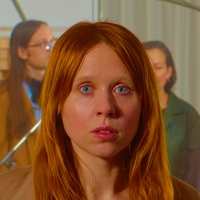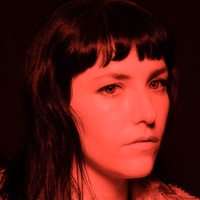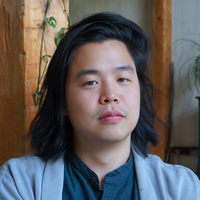As told to Emily Yoshida, 2858 words.
Tags: Music, Art, Inspiration, Process, Production, Collaboration, Multi-tasking.
On collaborating with machines and humans
Musician and sound artist Holly Herndon on balancing academic work with a career in music, the complications of working with AI and emerging technologies, fending off nostalgia, and what it means to be an active listener.You just defended your dissertation and got a Ph.D. What made you want to pursue something academic in the middle of creating and releasing music and touring?
Well, I started it seven years ago. I got into the program before Movement came out, which was my first album. I always thought no one would ever care about my music, and I thought I needed to find some sort of academic position so I could keep making my weird work and have a steady income. Then Movement came out, and it’s not like it was a huge album, but more people cared about it than I imagined, so then it became this weird juggling act of trying to tour albums while being in school, which was pretty intense. I was grading papers on international flights—it was like that.
A lot of people in that situation would tell themselves, “Okay, I guess this means I don’t need to get a degree.” What made you want to keep at it and finish?
Even though there was some interest in what I was doing, it’s pretty esoteric—it’s not like there’s this clearly defined career path for me. I’m having to kind of make it up as I go along. So for me, it’s really about security. I mean, I’m not from a rich family, and I want to be able to have a normal life. I was also really attracted to the brain trust of that particular university and the history and people that were there and are there, so it wasn’t a question for me to drop out. It was just like, “It might take a little longer, but I’m going to see this thing through.”
I’m sure it inevitably becomes a form of enrichment, or finds its way into your recording career as well.
It absolutely does. I mean, I feel like I have a research-oriented pop-music practice, which doesn’t always make sense! But I love making albums, and an album is a format that’s a really beautiful thing, and that is kind of disappearing in a lot of ways. But even the album can’t contain everything. It’s nice to have other outlets to be able to express those ideas.
Your albums have tended to have a specific innovation or idea or thesis guiding them. For Proto you developed an entire AI. When you’re in between projects and you’re figuring out what the next idea is you want to explore, what is that in-between space like?
That space is hell. We were touring really extensively for Platform, we toured it forever, it seemed like. Then as that was kind of wrapping up, we moved to Berlin, and I sat down and was like, “Okay, it’s time to write another album.” And that’s not how the brain works at all. I needed to feed my brain again with new stuff. But I was rushing it, and I made a bunch of stuff, and it was all kind of like Platform 2.0. And that’s just not what is needed right now. I don’t need a continuation of that. So it took a little longer than I would’ve liked, but these things take time.
We had started to expand the live show with Platform, so it started off as me, and then it was me and Mat [Dryhurst], then it was me and Mat and Colin [Self], and I was like, “God, it’s so fun to play with human performers.” I was also noticing a lot of the time, especially at electronic music festivals, we were often the only performers. It was mostly DJs or people playing just a laptop without any kind of live element. I don’t have any kind of puritanical views on that, but it just felt a bit homogenous. I was like, “Where is the human?” It felt like everything was getting fully automated—even the light show would be synchronized to the kick drum. I could leave the stage and the whole thing would just keep going. I mean, I also love those kinds of shows, they’re really fun and overwhelming. But when everybody’s doing that, I start to ask myself, “Wait, are we missing something here? Are we automating ourselves off the stage?” That was kind of the starting point of Proto.
I’d also always dreamed of working with a vocal ensemble, I just think that’s so cool. And Berlin is the kind of place that can facilitate that, because people have more time, and people are a bit more wild.
You’ve been living in Berlin now for three years, though you’d been there off and on prior to that. What have been the benefits of living and working there for you?
I think the obvious ones are that it’s more affordable, so people have more time. Every city has its own personality—of course, it’s full of individuals with their own ideology and ideas—but there is kind of a vibe for a city, for lack of a better word. I feel like Berlin thrives on experimentation. People are a bit wilder somehow, or at least the musicians that I encounter. They’re often much less professional, which brings its own challenges, but that also brings an openness and a playfulness that I really value. Not everything has to be this strategic career move, like it can actually just be an exploration.
I think it can make a big difference to live somewhere like Berlin, where, even on an institutional, governmental level, people value art and experimentation.
Yeah, and if you look at the history of it, I think it’s really tied to the Bundeswehr, the mandatory one- to two-year military service for men [which was enforced until 2011]. If you lived in Berlin, you didn’t have to join the Bundeswehr, so any young man who didn’t want to go to the military moved to Berlin. The women were exempt from it, but it naturally attracted people who were not into the military, like a kind of filtration process.
Also there’s this whole legacy of the American state department funding avant garde music, and in Germany and Berlin specifically it was a kind of political, strategic move against the then Soviet Union. There’s HKW [Haus Der Kulturen Der Welt—an arts complex and center for cultural exchange in Berlin’s Tiergarten Park]. That was built and funded by the U.S., and they set that up as this kind of American idealism, a monument to America’s view of globalism. I mean, that whole history, of course that’s affecting me as well.
I read another interview where you talked about approaching your work as a kind of collective process that was less driven by your ego, even though it ultimately has your name on it. What are some ways in which you practically apply that idea to your work?
I think working with AI does that automatically. Because that’s the dirty secret of AI, is that it appears as this singular entity, but there are billions of humans behind the scenes who have made it possible. I think it’s definitely a continuation of this idea that things don’t happen in a vacuum; they come out of a community. With [the SPAWN] technology specifically, it’s very much the case. But, of course, it’s not like a democracy, my ensemble. It is hierarchical, but I think there are ways of working with people.
For example, I’ve done some New Music composition projects, and often in that situation, the people you work with want you to take on this role—almost like an S&M dictatorial role as “the composer.” And the player is like, “I’m not doing it right, it must be like this,” or really fine-tuning it. A lot of players really get off on that, it’s like they’ve been training their whole lives and they really just want to please someone, they want to be challenged. But that’s not how I thrive at all. I like for things to be really communicative, I like for someone to have an idea and then for us to try it, and then I’ll decide whether it works.
Your approach to AI is so human-oriented, and a real push back against the scary Elon Musk vision of the future, with the unfriendly AI taking over everything. How have you made friends with technology over the years?
I think I’m trying not to oversimplify the conversation. There may have been a time when everything’s good or bad, or pro or contra, but the issue is obviously more nuanced than that. Criticism is great—I mean, I live in Germany, the Germans love to criticize. Having a critical outlook towards technology is a very positive thing, but that’s step one. If you don’t go to step two and have a vision, then you’re basically conceding and allowing someone else to create that vision. I’d like to have agency in the conversation, where I can actually develop the kind of vision that I want, and I think that that’s where music and art, and fantasy and world building and those kind of things can come into play.
It’s a really purposeful, considered approach to the tools you use. These days, usually, when we think of principled uses of a certain mediums and technologies, it’s more about an absence of technology than a purposeful use of it. In film it might be a filmmaker who only shoots on film stock, for example, or analog-only recording.
I think sometimes limitations can be really good for creation. Like if someone’s saying, “I’m not going to use XYZ,” maybe that creates space for something new. My fear with a lot of that stuff is that you kind of end up repeating stuff that’s already happened before.
That it’s nostalgic.
And I hate that. That’s my biggest pet peeve in music, especially this kind of LARPing of the radicalism of yore. Just because something was radical in the ’70s doesn’t mean you can put on the outfit and that makes you radical. Those ideas were difficult at the time and they were worked through in the public theater.
There was a purpose for it in that time.
And it was challenging in that time. But today is so exciting. I mean, the stuff that’s going on right now is insane, and we need people to be responding to it. If I can’t hear the present or the future in culture, I feel like we’re doomed to repeat the past forever. We’re not opening up that kind of mental space we need to move forward. It’s like that Mark Fisher idea of capitalism—it’s easier to imagine death than life after capitalism. That’s how I feel when I just see things like Stranger Things on repeat all the time. I get it, that stuff is fun to watch, and I also like ’80s movies, you know what I mean? There’s a time and a place for that. But when all of culture feels like that, it makes me nervous.
So many of the ideas that you’re working with are so conceptual and technical and philosophical. Why is music the way you’ve ultimately decided to address them?
That’s a good question I often ask myself. When I am working on music, I’m very rarely listening to music—I’m usually reading something. So why am I in music? I think it’s just it started at a younger age, it became this language that I understood. I always felt slightly alienated from the art world, like the capital-A “Art” world, because I felt like you had to be really rich to participate in that.
I mean, I think that ended up being a pretty true kind of intuition. You’re trying to find a couple of wealthy people or influential people who will be your patron and support you, and music felt like it was more democratic, in a way. My friends in music are a bit more scruffy, and I kind of felt more comfortable in those environments. And I just grew up making music. I don’t know, I think sometimes you don’t choose these things, they choose you, you know?
Music has found its own version of that patron system now. A lot of it is reliant on big corporations who have decided it benefits their brand for them to be involved with “the music scene.” They can singlehandedly realize a lot of big, ambitious projects that otherwise wouldn’t be possible. But it’s totally at the mercy of these patrons’ whims—if they get bored, then that can mean the difference between getting to work or not. It can feel like your career exists within someone else’s hobby.
That’s a good way of putting it, and it’s sort of nerve-wracking when it’s your livelihood. I guess, how do you negotiate that then, not just for somebody like Red Bull but with the economic side of touring and of getting to do really special live projects, or one-off type things?
I try to not make myself too reliant on one source of income. You have to be kind of like an octopus, and each leg is like a different muscle, and I try not to be entirely dependent on any one of those legs. We have to diversify. My partner teaches, I have been going to school and I probably will teach at some point, and we do commission work, we do stuff in the art world. You just have to be flexible in that way. And the relationship to corporate money is changing in music quite a lot.
But I mean, we as a society decided that music wasn’t valuable, or that we didn’t want to pay for it. That was ushered in through a kind of Silicon Valley ideology of “move fast and break everything.” I don’t think that’s the actual tagline—
I think it’s “break things.”
I know, but it should be. ”Move fast and destroy everything.” I get that desire to change things and try new things, but so much of it is coming from this one very particular worldview that is so prevalent in the Bay Area. It’s so rare that an artist will be invited in to one of these companies to be asked, “How is what we’re doing working for you?” There’s a major shift happening in the way that platforms are dealing with music, specifically moving from the intent of the composer—which has always been the kind of focus of music—to the desires of the consumer.
With playlists, the songs are decontextualized from their albums and creators, and there are apps now that match the music to your heart rate, so as you start running faster they speed up the music. Well, maybe the composer didn’t mean for you to play it at that BPM. But the consumer says, “No, I’m jogging and I need it at my BPM.” This is a dramatic shift in focus, between the intent of the composer and what the consumer wants.
But not getting what you want can be really important. If I think about my 16-year-old self and what I would’ve demanded, if I had just been fed what I wanted the whole time, my music tastes would be brutal right now. I would not have developed as a human being, and it’s important that you listen to things and watch things that make you uncomfortable, that you don’t understand, that you don’t even like at first, because you grow through that. I think that shift in focus is not a good thing for music.
That’s the fundamental issue that I have with streaming as a concept. People are always arguing about who pays the worst, but regardless of what the fraction of a penny is, to me, that’s not the issue. I mean, of course it would be better to get paid more, but to me, the paradigm is the issue. You’re talking about passive listening and active listening. Passive listening is what is monetized well, what makes songs perform well on platforms. Active listening, you know—the most important music to me has been music I only needed to listen to once or twice to get access to the idea, and then once I understood the idea, it opens up a whole world of things. That can’t be valued in number of plays the same way as something that I’m passively playing at a dinner party.
It’s so hard to be able to differentiate between those two modes, but I think for experimental or challenging music, streaming is kind of fundamentally flawed. I don’t have a proposal for how to fix that—I’m doing what I just said that you shouldn’t do, just criticizing and not having a proposal. But we need to find a way to value active listening again.
Holly Herndon recommends:
Gary Tomlinson, A Million Years of Music
Reza Negaristani, Intelligence and Spirit
Mat Dryhurst’s talk “Protocols: Duty, Despair and Decentralisation”




